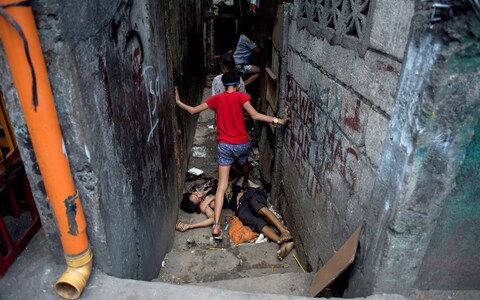It was a humid August night in 2016 and Maria was drifting off to sleep next to her husband after putting their baby to bed when six men burst through the front door of their Manila home and thrust guns in their faces.
“They wore masks and carried long firearms with [tactical] lights. They grabbed my husband to look at his face and identify him before forcing him out of bed and out of the house,” she said.
When a distraught Maria tried to intervene, one of the men aimed his weapon at her. “He told me not to stop them and to take care of the children,” she said. The next day, her husband’s dead body was found in the street.
Maria, 44, a mother of six, represents one of dozens of families who lost loved ones to the Philippines’ brutal war on drugs and are now pursuing justice through the International Criminal Court (ICC) in the Hague.
More than 6,000 suspected drug users and sellers, most of them impoverished and living in slums in and around the capital, were officially killed in a nationwide crackdown on drugs instigated by then President Rodrigo Duterte when he rose to power in 2016.
The body of Valien Mendoza, a suspected drug dealer, who was gunned down by unidentified assailants in Manila
Credit: NOEL CELIS/AFP/Getty Images
Human rights groups say the death toll was much higher and should include unsolved killings by assassins on motorbikes, who are suspected to have had links to the police.
In 2020, the United Nations alleged tens of thousands may have been killed in the war on drugs since mid-2016, including at least 73 children, amid “near impunity” for police and an incitement to violence by top officials.
To date, there have been only three prosecutions and convictions for drugs-related extrajudicial killings.
Wives and mothers like Maria, who have struggled to feed their children since their husbands were murdered, are now pinning their hopes on the ICC to bring accountability for their killers.
Maria, who asked for her name to be changed for security reasons, claimed she had been taunted by the police that she had no evidence her husband’s murder was linked to them. Her anger at their cruelty was in part driving her quest for “justice for my husband”.
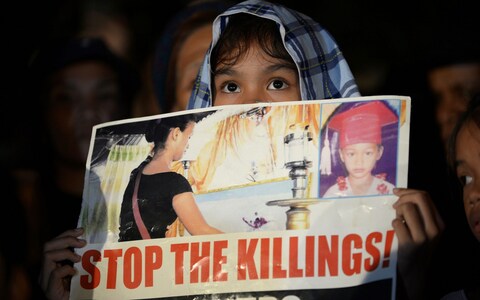

The United Nations believes tens of thousands may have been killed in the war on drugs since mid-2016
Credit: TED ALJIBE/AFP via Getty Images
Angela, 48, from Quezon City, joined the legal fight after her husband, a jeepney driver, was “brutally murdered”.
The mother of three had heard muffled shots on December 7, 2016, the night her construction worker husband died, but did not recognise it was gunfire until her sister-in-law knocked on the door and broke the terrible news.
She ran outside into the family compound, where police officers were shouting that nobody should move. “I knew the policemen were the ones who shot my husband,” she alleged.
But amid thousands of killings of this nature, and with few officials willing to listen, it has been impossible to prove such claims.
Motorbike assassins and vigilante killers
Angela’s husband’s name was on the dreaded “Tokhang” list, a so-called watch list that began under an antidrug campaign named “Oplan Tokhang” and identified drug suspects for rehabilitation.
Instead, it became associated with killings, many of them by unidentified hitmen, who often hunted down their victims on motorbikes.
In many other cases, the police said they shot drug suspects in self-defence – an assertion that family members and rights groups have often disputed.
“Many cases are vigilante killings so there are no perpetrators. It is hard to file a criminal case against a masked man who nobody can identify,” said Catherine Lopez, a lawyer working for IDEALS, a non-profit advocacy group offering legal assistance to vulnerable communities in the Philippines.
“The most we can do to implicate the police is to say that they did not investigate a case. So instead of a criminal case for murder when someone is killed, it’s more an administrative charge for neglect of duty.”
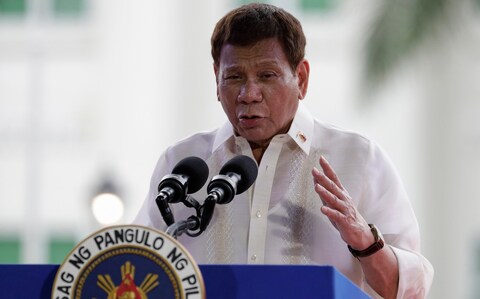

Former President Rodrigo Duterte defended his government’s crackdown as ‘lawfully directed against drug lords and pushers’ destroying society
Credit: Aaron Favila/AP
IDEALS was one of several legal groups that provided evidence to the ICC when it was deliberating on an appeal by the Philippine government to block an investigation into possible “crimes against humanity” during the bloody war on drugs.
“We gave information on how there has been no genuine investigation of the killings,” said Ms Lopez, citing testimonies from about 100 families of victims.
Last month, the ICC rejected the appeal, meaning the Philippines authorities have now exhausted their options to avoid an international probe.
The Hague-based court had initially announced plans for an investigation in February 2018, but it was suspended in November 2021 after Manila said it was launching its own review.
Former President Duterte, who defended his government’s crackdown as “lawfully directed against drug lords and pushers” destroying society, withdrew the Philippines as a signatory to the court in 2019, in what rights activists have decried as a move to evade justice.
However, the ICC still has jurisdiction over alleged crimes committed between 2016 and 2019, when the country was still a member state.
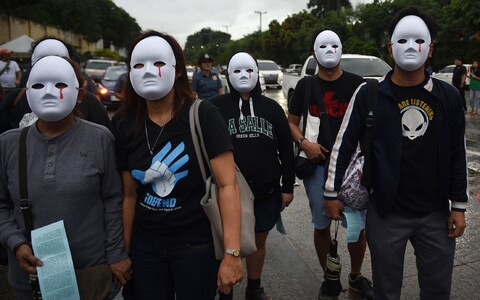

To date, there have been only three prosecutions and convictions for drugs-related extrajudicial killings
Credit: ALJIBETED ALJIBE/AFP/Getty Images
The Office of the Prosecutor (OTP) at the court said its investigation did not set out to target individuals but would start by considering broad allegations of criminal conduct.
“We set a focus on the most serious, representative crimes allegedly committed and then seek to identify and prosecute those most responsible,” it said in a statement.
But the path to justice remains uncertain for victims.
Ferdinand Marcos Jr, who succeeded Mr Duterte as president last year, has confirmed Manila does not recognise the court’s authority over matters of national sovereignty, and said the country will “disengage” from contact with the ICC.
Ms Lopez said that even if the ICC could not count on Manila’s cooperation, a simple “acknowledgement of the truth” remained important to families who had lost loved ones.
“These ICC proceedings give them hope and courage to push through their cases domestically. Any acknowledgement by foreign bodies or international tribunals of what has been happening here is an end in itself,” she said.
For Randy Delos Santos, the uncle of Kian, 17, whose summary execution by plain clothes police officers in August 2017 was caught on CCTV and shocked the nation, the ICC case is a vital step in holding the authorities to account.
The police claimed Kian was killed after he fired on them during an anti-drugs operation, but eyewitnesses, as well as the footage, revealed officers dragged him into a dark corner of an alleyway and shot him.
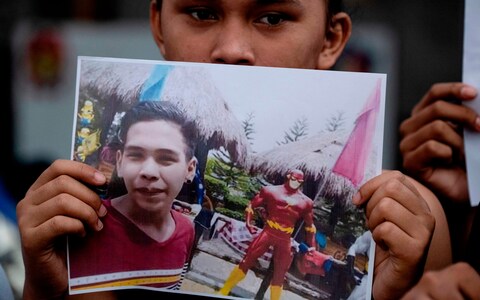

The police claimed Kian Loyd Delos Santos, 17, was killed after he fired on them during an anti-drugs operation
Credit: Noel Celis/AFP/Getty Images
The killing led to the rare conviction of three officers, but earlier this year, a fresh forensic investigation of his exhumed body uncovered another bullet, and unleashed accusations the original autopsy had been botched.
“I feel uncomfortable with the government using the case of my nephew and telling the whole world that the justice system in the Philippines is working. We did not receive full justice in his case,” said Delos Santos.
Throughout the trial, he said he received threatening text messages and one time a warning that people on motorcycles were circling near his home.
Even now, working for “Program Paghilom”, a Catholic non-profit founded to help widows and orphans of victims, Mr Delos Santos has a “plan A and plan B” in case assailants attack the building.
Maria and Angela said they had not received direct threats but felt intimidated by the police as they pursued the truth about their husbands’ murders.
“The ICC investigation in the Philippines is the only credible avenue for justice for the victims of former President Rodrigo Duterte’s murderous ‘war on drugs’,” said Maria Elena Vignoli, senior international justice counsel at Human Rights Watch.
“The Philippine government is not genuinely investigating and prosecuting the ‘drug war’ killings and the ICC offers a path forward to fill the ongoing accountability vacuum,” she said.
“The Marcos administration should back up its stated commitment to human rights and the fight against impunity by cooperating with the court’s investigation.”
Protect yourself and your family by learning more about Global Health Security
This post was originally published on this site be sure to check out more of their content.




